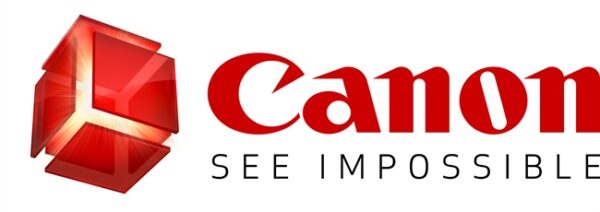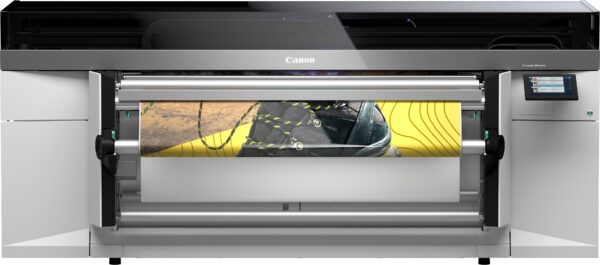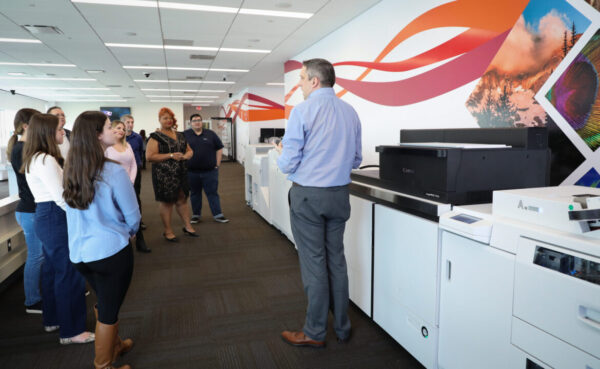As the second generation takes the helm, Vision Office Systems proves bigger isn’t always better.
Vision Office Systems in Charlotte, North Carolina, is proof positive that successful dealerships also come in small packages. The company represents a significant population of dealerships with average yearly revenues south of $5 million that are still conducting business as usual in a world of mega-dealers and private-equity-backed dealerships.
With the majority of dealers’ clients being SMBs, being part of this club can be advantageous. Plenty of SMB customers still prefer doing business with another local business. And Vision Office Systems is firmly entrenched in the local Charlotte market, catering to the office technology needs of those SMBs for 23 years.
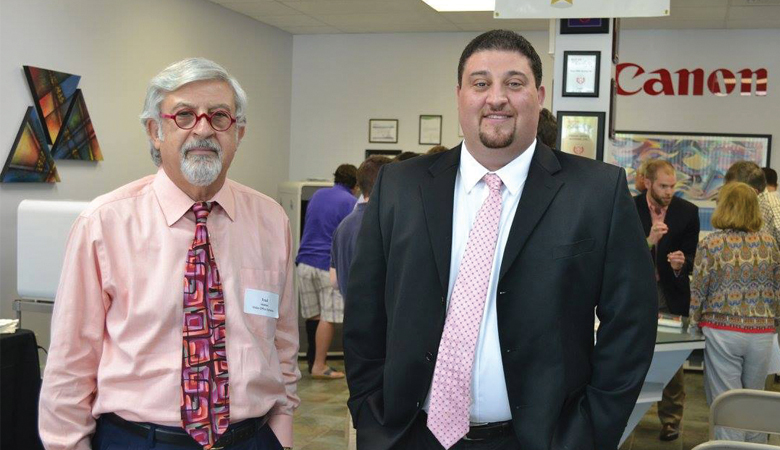
Above: Vision’s founder Fred Habbal with his son Jason who oversees the dealership’s day to day operations.
Founded in 1997 by Fred Habbal, Vision Office Systems is a dealership in transition as Fred is passing his legacy and leadership to the next generation, his son Jason who joined the company 14 years ago, soon after graduating from Western Carolina University in 2007.
Fred spent his entire career in the copier industry in Charlotte, working for two large dealerships with branches across North and South Carolina. When he founded Vision Office Systems, there was no question as to the location. Today, although Fred is mostly semi-retired, Jason confers with him daily about the business.
Vision’s emergence as a family business happened more by accident than from some grand plan.
Initially, Jason had no intention of working for his father, even though he worked in Vision’s warehouse in high school and college. After studying IT in college, Jason realized he didn’t want to work in that field. Instead, he accepted a position as an account executive at Vision one week after graduation. His first week on the job was brutal.
“I went out the first day and was amazed at the people who said, ‘No, don’t care, don’t want you in here, get out of my office,’” said Jason. “I came back to the office and I was like, I don’t want to do this anymore. I need an office job.”
An office job was not an option, and Jason found himself back on the street cold-calling. After surviving a week of rejection, things changed the following week. He met with the owner of a boat dealership that needed a used copier. Jason had the perfect copier, except the owner saw the same machine on eBay for less, so Jason matched the price.
“I made $150 commission,” he remembered. “I thought that was big money and said, ‘hey, this is awesome!'”
After that, Jason considered what he needed to do to sway prospects who were saying no to say yes. He read all he could about sales, and as he honed his skills, things started clicking.
“I was in a mode where my competitors were my enemies, and I was going after them and their accounts,” said Jason. “If they sell something in my territory, they’re stealing from me. That’s the mentality I’ve had ever since.”
And that’s the mentality that has helped Jason grow into his current leadership role at Vision.
The company has approximately 40 employees, including Jason’s wife, Malea, who oversees Vision’s leasing division and assists with various administrative tasks around the office and in the warehouse.
Vendor Appreciation
Vision sells Sharp, Canon, Brother, Muratec, and Lexmark. Vision was a single-line Savin dealer for many years. When that relationship soured, Vision started looking elsewhere.
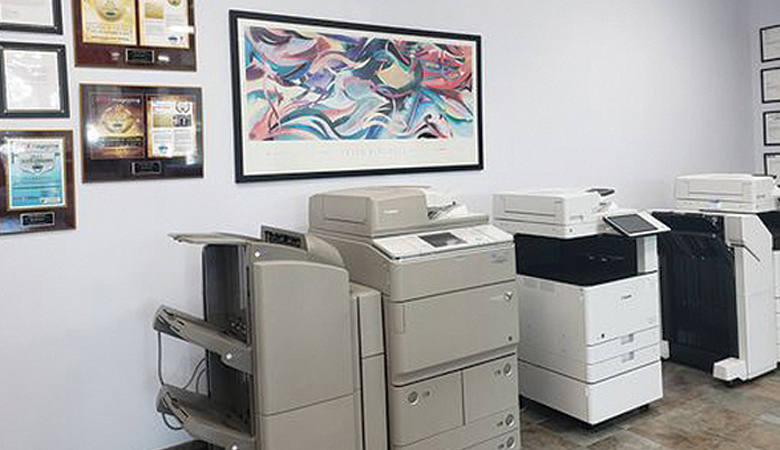
Above: Vision Office Systems is a multi-line dealer carrying Sharp, Canon, Brother, and Lexmark products.
“We had all our eggs in one basket for a long time,” said Jason. “Then, we added a line here, a line there. We realized that everybody needs a little bit of love, and it protects us.”
Three years ago, Vision added Brother A4 MFPs and printers to the mix after Fred attended a Brother dealer meeting in Palm Springs. The company was recruiting dealers, and Fred returned enthused about the company’s products. Jason was less than excited. Even when Brother sent Vision the color MFC-L9570 A4 MFP to try out, neither Jason nor Vision’s vice president of service wanted anything to do with Brother. That’s because they didn’t consider the company as a legitimate commercial office technology supplier since most of its products were aimed at consumers and SOHO customers.
As Jason told Fred, “I’m not interested in chasing that junk down the street.”
After four days, Jason and the VP of service relented and took a closer look at the Brother MFP and saw the potential. After a Brother representative dropped in to give a presentation, they were hooked. Since then, Vision’s printer and A4 business has exploded.
“The machines work, and Brother’s support is second to none,” said Jason. “We’re pleased with their products and people.”
Diversification Ups and Downs
Few dealers can survive by only selling traditional MFPs and printers. Vision Office Systems has experienced its share of ups and downs in its attempts to broaden its product offerings.
Take managed IT. Vision does not currently offer it, even though the dealership partnered with a local IT provider for a while. The Habbals eventually decided they did not want to be responsible for the customer’s data loss should the unthinkable happen. They also felt they needed a person who knew the business to properly sell it.
“We never really took the leap to hire anybody to just sell IT,” said Jason. “I’m not saying that we never will, but it’s not on our radar right now, mainly because it’s hard for me to want to do it after hearing the horror stories of the people that have been doing it for 10 or 12 years and are just now making money.”
Vision also briefly dabbled in 3D printers, something Jason described as a $150,000 mistake.
“I don’t think the market was quite there when we started,” he acknowledged. “I’ve talked to other dealers who told me the same thing. We would go into these meetings with these big companies, and we’re like, okay, they’re going to buy two or three. Then, they come back and say, ‘We talked to such and such other brand, they have the same specs, but they cost 30% less.’ We fought it and fought it. We hired somebody who knew the industry, we sold a few small ones to some schools, but we ended up donating our bigger machines to the engineering school at University of North Carolina at Charlotte. We couldn’t get out of that business fast enough.”
As Bob Dylan sang, “There’s no success like failure, and failure’s no success at all.”
None of those pitfalls have dampened Jason’s enthusiasm for looking at new diversification opportunities. Chalk those up to learning experiences. Phone systems are one possibility. Jason has been doing his research, and a strategy that makes the most sense to him is where Vision handles lead generation, and the partner handles the rest.
“If I can bring them the customer, they sell them a $2,000-a-month phone system, I get a couple thousand dollars upfront and a little bit of the recurring revenue,” said Jason. “That’s a win for me and a win for them.”
He also sees an opportunity to grow Vision’s wide-format business as more companies scrutinize the costs associated with outsourcing wide-format print jobs. Since June, Vision has sold close to a dozen Canon wide-format machines, mostly to construction companies and contractors that have brought wide-format printing in-house.
“I’m hoping that trend continues because the aftermarket is good, and it’s something that not everybody around the corner has, so the competition is not as high,” said Jason.
Recently, Vision has been selling OneScreen GoSafe body temperature scanners. The challenge is obtaining them.
“They’re air freighting them over from China as quick as they can,” stated Jason. “We sold about 10 right off the bat. Then, we placed our next group of orders. You have to wait three or four weeks to get them. We’re trying to order more inventory, but we also are trying to be smart and not get stuck with any.”
Despite the shipping delay, Jason believes there will be a market for these products even after the pandemic subsides.
“A lot of people we’ve sold them to have said, ‘I’m not buying it because of COVID. COVID opened my eyes to it, but we’ll use it going forward for anybody who comes into our office because if they have a fever, we don’t want them in here,’” said Jason.
Smart Growth
Becoming a mega-dealer is not in the cards for Vision Office Systems, but prudent expansion is. Jason admits he is enthusiastic about growing the business while his father has been more reticent.
“I’m always go, go, go,” said Jason. “He’s more like pull back the reins, let’s think about it, and do it at the right time.”
In 2018, Vision opened an office in Greenville, South Carolina. This past July, with the help of Sharp, the dealership expanded into Asheville, North Carolina. Sharp’s assistance consists of pricing programs to help establish Vision in that market.
“We don’t do it by acquisition,” explained Jason. “We go in with whatever base we have and build off of that. It’s slow and steady. We’re doing it the right way. We take care of the customer, we’re earning the business, we’re not buying the business. We will do the whole office and staff thing when the time is right.”
Vision doesn’t need much to enter a new market.
“Some people, I’m not saying they do it wrong, but they get these big expensive offices and hire five, six people to sell,” said Jason. “That’s okay, but that adds so much to overhead.”
Vision has a small office in downtown Asheville with someone who answers the phone. As leads come in, Jason or account executives from Vision’s Greenville office, which is closer to Asheville, follow up. Periodically, Jason and other team members travel to Asheville for prospecting.
Crisis Management
When the pandemic hit and North Carolina went into its version of a lockdown, Vision had a huge pipeline of machines ready to roll. Fortunately, the dealership was deemed an essential business and didn’t shut down during the initial wave of closings.
“We were sitting here saying, what’s everybody complaining about bad business?” recalled Jason. “Our trucks are running every day.”
For about two weeks, Vision was swamped. Even though service calls had dropped off, sales were strong, and its delivery calendar was full. After two weeks, everything ground to a halt.
“We all sat on our hands for about three or four weeks,” said Jason. Vision applied for the Paycheck Protection Program (PPP) and furloughed its employees to get over the initial hump. By the end of April, furloughed employees had returned to work.
Since March, Vision’s business has been what one would expect during this time. Clicks were down close to 40%. Fortunately, Vision had legal clients, as well as a large retailer that was still opening stores, buying equipment, and doing a fair amount of printing. According to Jason, the retail client’s volume was up 30%.
While April and August were the most troublesome months, September was looking up.
“We can’t get machines set up fast enough,” reported Jason.
One of the biggest challenges for Jason during the pandemic is the lack of face-to-face contact with customers. Despite being a millennial, he is not a fan of Zoom and all the other technologies that substitute for in-person meetings.
“I was taught to do business with a handshake and in person,” he said. “I’m a techy, I love all that stuff, but it’s hard for me to get behind.”
That didn’t stop him from reaching out to customers via email and telephone to see how they were doing. There were no expectations of selling. That personal touch paid off, and some of those customers are now calling on Vision to upgrade their machines.
Meanwhile, Jason is reaching out to clients to schedule in-person meetings. About 80% of those he has contacted are opening their doors to him.
“I’m looking forward to being back in front of people,” said Jason.
The Future Looks Bright
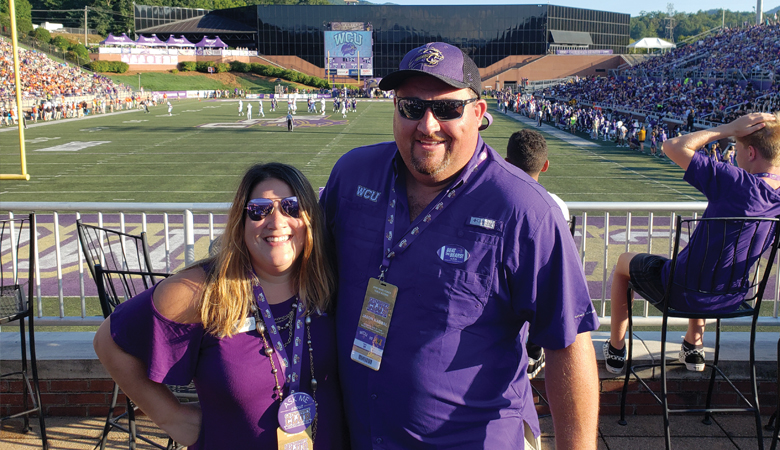
Above: Jason Habbal and his wife Malea take a break from the business on the weekend to attend a football game at Jason’s alma mater, Western Carolina University in 2019.
A pandemic and an economic downturn have not dampened Jason’s enthusiasm for the business.
“I enjoy this business,” said Jason. “There’s still money to be made even though the naysayers say there isn’t. If you adapt in the correct way, you will survive just fine. The pandemic caused a lot of people in our industry to open their eyes and say, wait a minute, we need to change the way we’ve been doing things, whether we need to be more cognizant of inventories or costs. Diversification will continue to be important. What will set people apart is how you treated your customers the last three or four months, and how you treat them the rest of this pandemic. And how you flex to their needs is going to say a lot about who survives once we’re back to whatever normal is.”
It’s that kind of spirit that underscores why smaller dealerships such as Vision Office Systems are integral to the independent dealer channel and the OEMs whose products they sell.
Access Related Content
Visit the www.thecannatareport.com. To become a subscriber, visit www.thecannatareport.com/register or contact cjcannata@cannatareport.com directly. Bulk subscription rates are also available.

